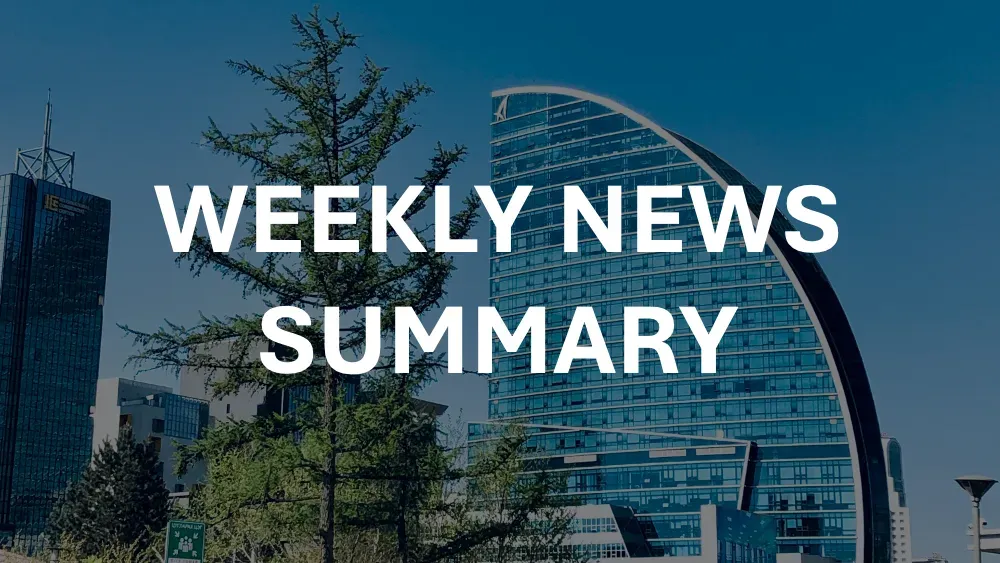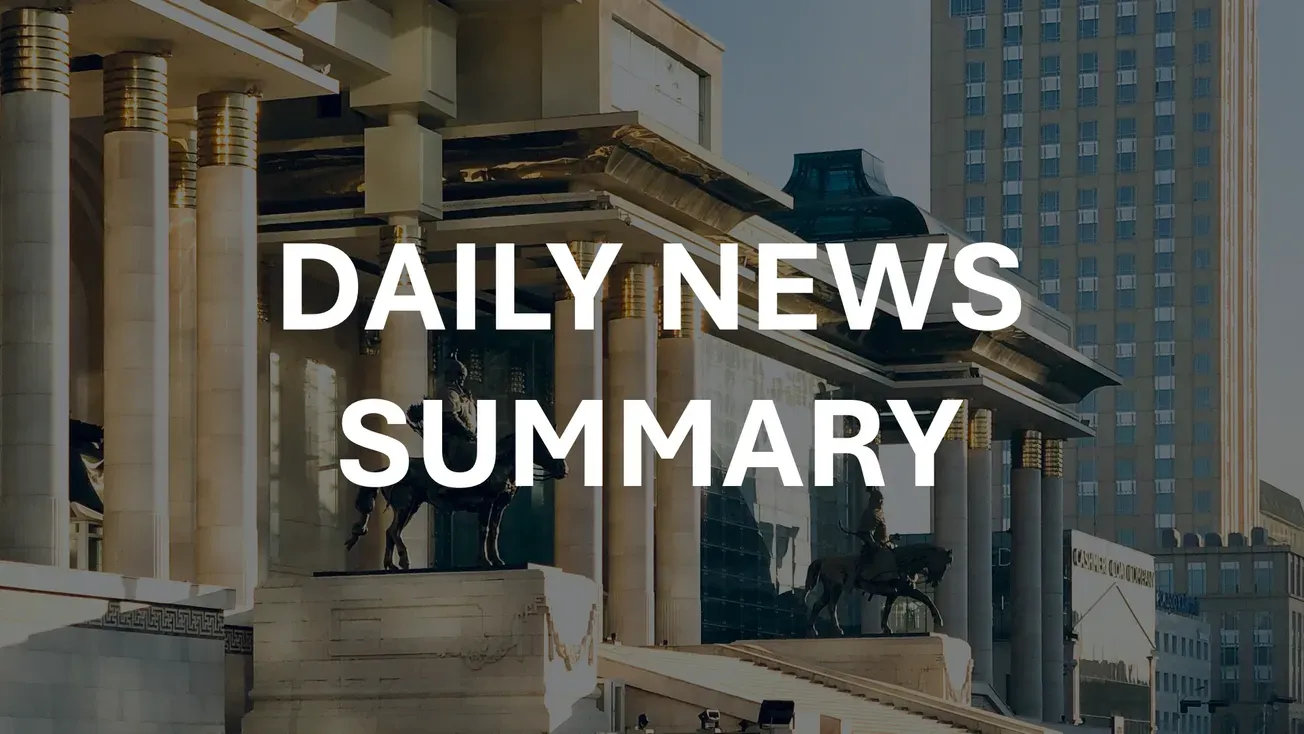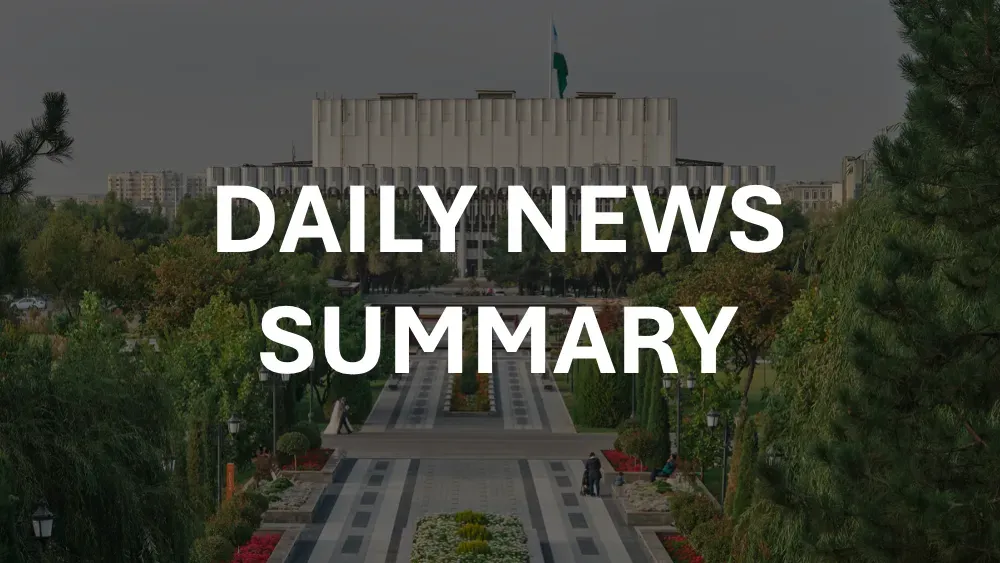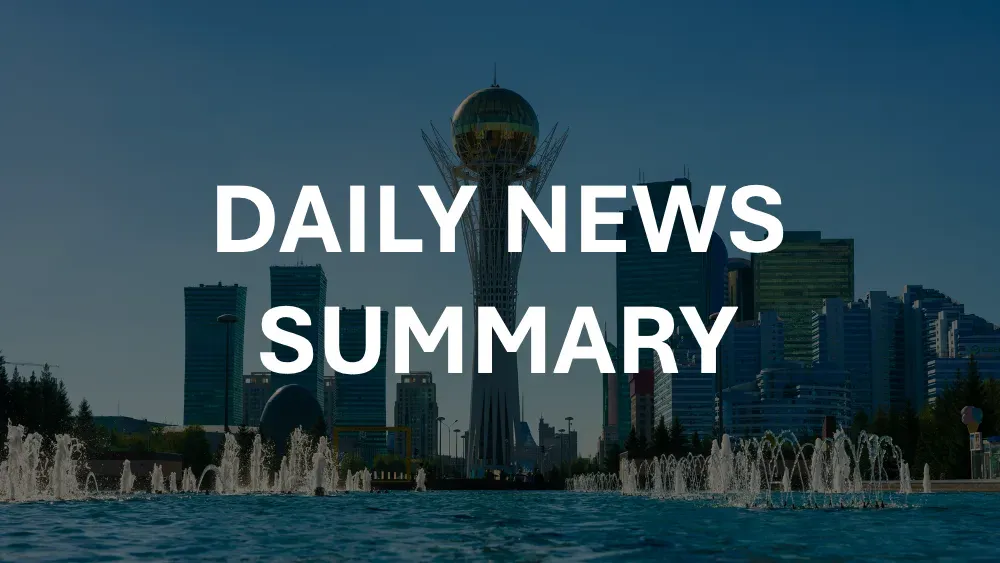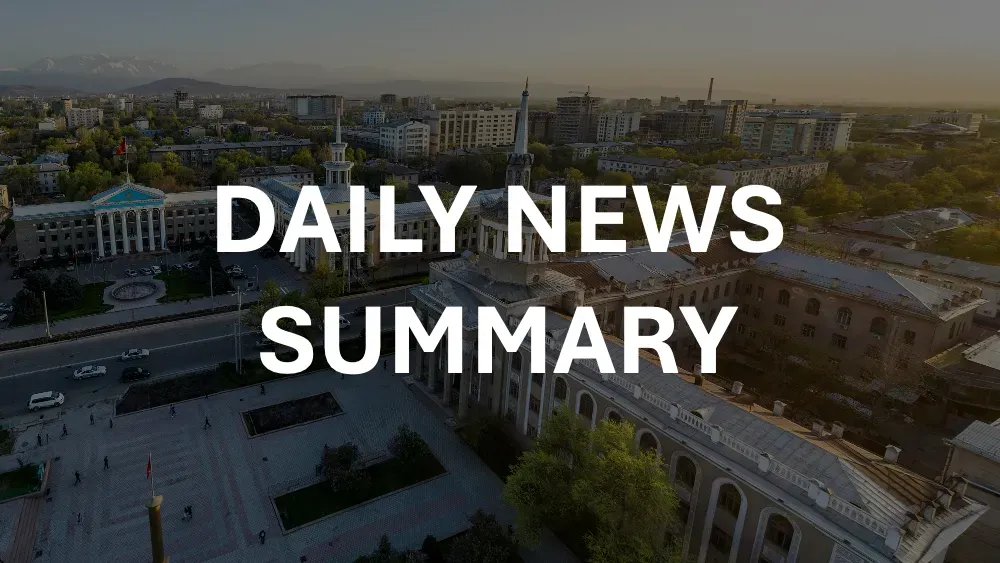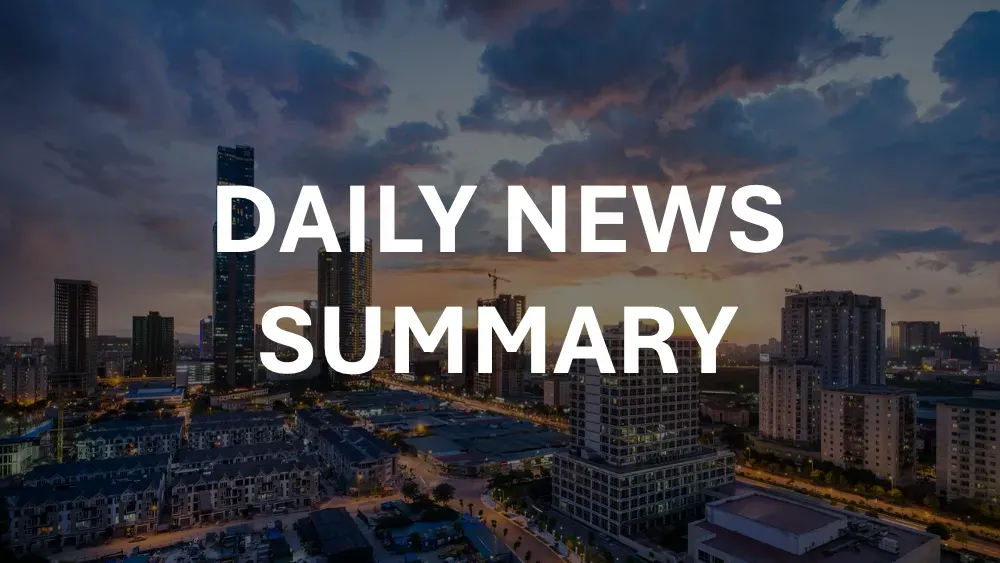August 1, 2025 to August 7, 2025
This week's top 10 stories from Mongolia, selected from our daily intelligence briefs.
Ready for real-time intelligence? Start your free daily trial now.
1. Oyu Tolgoi Achieves Record Copper and Concentrate Output in First Half of 2024
Oyu Tolgoi LLC achieved record copper production of 152,000 tonnes in the first half of 2024, marking a historic high driven by strong performance in both underground and open-pit operations. Concentrate output surged 47% year-on-year to 1,263,400 tonnes, while gold production reached 97,500 ounces, supported by higher ore grades from open-pit sequencing. These results signal stabilization of underground mining activities, critical for the long-term viability of one of the world’s largest copper-gold projects.
Since commencing operations in 2010, Oyu Tolgoi has contributed 13.1 trillion MNT to Mongolia’s state budget, underscoring its significant economic role domestically and its growing importance in global copper supply chains. The robust H1 2024 performance highlights the mine’s capacity to meet rising demand amid tightening global copper markets, reinforcing Mongolia’s strategic position in the international mining sector.
From daily brief: 2025-08-06
2. Accelerated Push for National Wealth Fund Reform Targets Mining Revenues and Transparency
Mongolia’s Prime Minister G. Zandanshatar has initiated an accelerated reform of the National Wealth Fund to enhance transparency and ensure equitable distribution of mining revenues to citizens. A task force led by Cabinet Secretary S. Byambatsogt has been established to fast-track the 2024 Wealth Fund Law’s implementation, recover state stakes in key mineral assets, and investigate the transfer of state-discovered deposits to private entities. The group is expected to deliver initial results within ten days, reflecting the government’s urgent commitment to strengthen state oversight and public trust in resource management.
Drawing inspiration from international models like Norway’s sovereign wealth fund, the reforms aim to secure sustained benefits from Mongolia’s strategic mineral resources amid growing public demand for fairness. Prime Minister Zandanshatar emphasized the importance of continuity and transparency, underscoring that the majority of resource-derived wealth must reach the population. This rapid push could significantly influence Mongolia’s economic framework and investment climate by reinforcing state control and accountability in the mining sector.
From daily brief: 2025-08-05
3. US Tariff Hike Triggers Global Market Downturn, Impacts Mongolian Exports
US President Donald Trump’s announcement of new import tariffs, ranging from 10% to 50% and effective August 7, has triggered a significant downturn in global markets, with the Dow Jones, S&P 500, and Nasdaq falling 1.23%, 1.6%, and 2.24% respectively—the steepest single-day declines in months. The tariffs apply broadly to nearly all trade partners, including Mongolia, whose exports to the US will now incur a 10% tariff. This policy shift is expected to increase costs, disrupt international trade flows, and contribute to inflationary pressures as companies exhaust pre-tariff stockpiles and face higher future shipment expenses. The move underscores escalating trade tensions and poses risks to sustained global economic growth.
From daily brief: 2025-08-04
4. Coal Export Contracts Renegotiated as Prices Drop and Sales Slow
Mongolia’s Erdenes Tavantolgoi JSC is renegotiating coal export contracts in response to a significant decline in global coal prices and a slowdown in buyer activity, which have led to reduced export volumes. Prime Minister G. Zandanshatar has instructed officials to expedite contract fulfillment and increase exports, emphasizing adherence to existing contract terms while ensuring timely delivery. The government is collaborating with buyers to optimize logistics and preserve the value of previously agreed high-price contracts without modifying their original conditions.
In the past month, the Mongolian Stock Exchange facilitated 16 coal trades totaling 1 million tons, signaling efforts to revitalize the market amid challenging conditions. These measures aim to stabilize Mongolia’s coal sector and sustain export revenues despite the adverse global price environment, reflecting a strategic balance between contractual obligations and market realities.
From daily brief: 2025-08-08
5. City Officials and Global Gas Leaders Discuss Cleaner Heating Initiatives
Ulaanbaatar city officials recently engaged with James Rockall, President of the World Liquefied Gas Association (WLGA), to discuss Mongolia’s transition toward cleaner heating solutions aimed at reducing urban air pollution. Deputy Mayor A. Amartuvshin outlined ongoing initiatives to insulate and convert 5,000 households in the Chingeltei and Bayangol districts from coal to gas heating, with plans to expand adoption of gas and electric systems citywide. Rockall emphasized the critical role of public education in this shift and affirmed WLGA’s support, drawing on the association’s experience in over 125 countries.
This collaboration underscores Ulaanbaatar’s strategic commitment to environmentally sustainable energy and improved air quality through the adoption of liquefied gas technologies. The partnership with WLGA not only facilitates technical and educational resources but also aligns Mongolia’s urban energy policies with global best practices in cleaner fuel transitions.
From daily brief: 2025-08-08
6. State-Owned Enterprises Face Major Restructuring and Push for Public Listings
The Mongolian government has unveiled a comprehensive restructuring plan for its state-owned enterprises (SOEs), aiming to reduce their number from 109 to 87 through mergers and dissolutions, while enhancing governance and transparency. Key to the reform is the planned public listing of shares—ranging from 10% to 66%—in 20 major SOEs, including Erdenet Mining, Erdenes Tavan Tolgoi, and MIAT, on both domestic and international stock exchanges. This move is expected to attract foreign investment and generate up to 3.7 trillion MNT in revenue. Additionally, executive compensation will shift to performance-based bonuses, with the highest SOE director salaries capped around 30 million MNT per month, addressing public concerns over remuneration practices.
Complementing these financial reforms, the government will phase out paper receipts in favor of digital e-receipts to improve operational efficiency and environmental sustainability. These initiatives collectively signal Mongolia’s strategic push to modernize its state sector, increase market discipline, and integrate more closely with global capital markets, positioning the country for enhanced economic resilience and investor confidence.
From daily brief: 2025-08-07
7. Strategic Wealth Fund Partnership Launched with Oman
Mongolia has launched a strategic partnership with Oman’s Sovereign Wealth Fund aimed at developing its national wealth fund and attracting foreign investment in mining, agriculture, and renewable energy sectors. During a high-level meeting, Prime Minister G. Zandanshatar highlighted the value of Oman’s expertise in managing oil and gas revenues to ensure sustainable investment practices. The Omani delegation, led by AbdulSalam Bin Muhammad Al-Murshidi, expressed commitment to collaborate on joint projects, signaling Mongolia’s intent to diversify its economy and align its wealth fund with international standards.
This partnership is poised to enhance Mongolia’s capacity to manage natural resource wealth effectively and improve its investment climate, potentially drawing increased international capital inflows. By leveraging Oman’s experience, Mongolia aims to strengthen long-term economic growth and foster cross-sector cooperation, particularly in key areas critical to its economic diversification strategy.
From daily brief: 2025-08-06
8. Industrial and Mining Cooperation Deepens Between Australia and Mongolia
Mongolia’s Minister of Industry and Mineral Resources, G. Damdinyam, met with Australian Ambassador Leo Zeng to enhance bilateral cooperation in the industrial and mining sectors ahead of the "Mining Week 2025" event in Ulaanbaatar this September. The discussions emphasized expanding Australian mining companies’ participation and increasing investment in key projects, particularly oil and coal-bed methane, as part of Mongolia’s strategy to diversify and modernize its resource base.
Minister Damdinyam underscored the government’s commitment to creating a stable, mutually beneficial partnership that facilitates foreign investment and technology transfer. This initiative reflects Mongolia’s broader goal to leverage international expertise and capital to drive sustainable development in its critical economic sectors, signaling promising opportunities for Australian stakeholders and reinforcing the strategic industrial ties between the two countries.
From daily brief: 2025-08-06
9. Copper Processing Complex Project Aims to Boost Value-Added Production and Profits
Mongolia is advancing its 2024-2028 national plan to enhance value-added production in the mining sector through the Copper Processing Complex project, which aims to process 560,000 tons of copper concentrate annually into 125,500 tons of cathode copper, alongside gold, silver, and sulfur byproducts. Projected to yield $56.8 million in net annual profit and recoup its investment within 7.7 years, this initiative reflects the government’s strategic shift from raw material exports toward domestic processing to bolster economic resilience. Industry Minister G. Damdinnyam highlighted the critical role of steel and copper processing in achieving sustainable development.
Concurrently, Erdenet Mining Corporation is expanding its ore reserves to 3.4 billion tons, securing operations for at least 55 years, and upgrading its facilities to support increased processing capacity. These developments underscore Mongolia’s commitment to strengthening its mining value chain and reducing dependency on commodity exports, positioning the country for greater industrial diversification and long-term economic growth.
From daily brief: 2025-08-05
10. Oman and Mongolia Deepen Strategic Investment Ties in Mining and Sovereign Wealth Fund Collaboration
Senior officials from Oman and Mongolia convened in Ulaanbaatar to strengthen strategic cooperation in mining, investment, and sovereign wealth fund management. Led by Mongolia’s Minister of Industry and Mineral Resources G. Damdinyam and Prime Minister G. Zandanshatar alongside Oman Investment Authority President Abdul Salam bin Mohammed Al-Murshidi, the discussions emphasized joint projects in mining, agriculture, and renewable energy. Mongolia aims to modernize its National Wealth Fund by leveraging Oman’s expertise in managing resource revenues, signaling a strategic move to diversify its economy and attract foreign investment. For Oman, this partnership opens new avenues for investment in Asia, aligning with its broader economic diversification goals.
From daily brief: 2025-08-05
This weekly digest is compiled from our daily Mongolia intelligence briefs. For daily coverage and analysis, upgrade your subscription.
